Miguel-Angel Soria | |
|---|---|
| Born | Tijuana, Mexico |
| Occupation | Artist, activist |
Miguel-Angel Soria is a Chicano community artist and activist from San Diego, California. He sometimes goes by the pen-name osokodiako.
Miguel-Angel Soria | |
|---|---|
| Born | Tijuana, Mexico |
| Occupation | Artist, activist |
Miguel-Angel Soria is a Chicano community artist and activist from San Diego, California. He sometimes goes by the pen-name osokodiako.
Born in Tijuana, Soria was raised a few blocks from Tijuana's Avenida Revolucion, he and his family eventually arrived on the U.S. side and settled in the San Ysidro–Nestor area of San Diego.
Soria was performing his poetry since the mid to late 1980s. He participated in the San Diego peace movement with the help of such groups as The Committee Opposed to Militarism and the Draft (COMD), and its Youth Activism Task Force (YATF). He penned work for journals such as The Non-Violent Activist and a number of local zines. Miguel-Angel read poetry at punk shows and at peace rallies. He was later known as a strong part of the MEChA poetry circles. He read in a number of regional, state, and eventually national MEChA conferences. He was very active in the Straight-Edge punk movement and helped organize a number of Unity Benefit concerts where acts from a different musical genres would come together.
While a student at the University of San Diego, he created an alternative poetry venue in the early 1990s to highlight the work of Xicana and Xicano artist, it was called "Noche de Atole". He always echoed the Xicana and Xicano activist of the first part of the Xicana/o movement in his belief that Xicana and Xicano poetry needed to pay tribute to its lineage. Thus, the use of the name atole. He invited many local theater, danza, music and poetry groups to the event. One highlight was the debut of a young poet then known to the world only for his journalism, Adolfo Guzman-Lopez. In addition to starting "Noche De Atole" he also proposed and founded "United Front" the University of San Diego's Multicultural student center.
Originally a participant in a poetry series called Taco Shop Poetry held at the Centro Cultural de la Raza, he formed the core of the spoken word/performance group Taco Shop Poets along with Adolfo Guzman-Lopez, Tomas Riley, and Adrian Arancibia. Soria was the group's Artistic Director, organizing rehearsals and leading their weekly meetings. Soria was also a consistent part of the TSP's line-up. He also acted as Executive Producer of Chorizo TongueFire, the TSP's first CD. Soria was a founding member of Voz Alta, a San Diego Chicana and Chicano art space.
Soria co-directed and co-produced "Chaldean Voices" [1] an award-winning documentary [2] with Peter Alaktib. [3] He is currently involved in writing, directing and producing video projects such as KIOSKO!, a children's show he created. [4] He was a member of Loko Artz Collective, a video production company based out of San Diego. [5]

Chicano or Chicana is a chosen identity for many Mexican Americans in the United States. The label Chicano is sometimes used interchangeably with Mexican American, although the terms have different meanings. While Mexican-American identity emerged to encourage assimilation into White American society and separate the community from African-American political struggle, Chicano identity emerged among anti-assimilationist youth, some of whom belonged to the Pachuco subculture, who claimed the term. Chicano was widely reclaimed in the 1960s and 1970s to express political empowerment, ethnic solidarity, and pride in being of Indigenous descent, diverging from the more assimilationist Mexican American identity. Chicano Movement leaders collaborated with Black Power movement. Chicano youth in barrios rejected cultural assimilation into whiteness and embraced their identity and worldview as a form of empowerment and resistance.
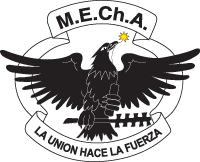
M.E.Ch.A. is a US-based organization that seeks to promote Chicano unity and empowerment through political action. The acronym of the organization's name is the Chicano word mecha, which is the Chicano pronunciation of the English word match and therefore symbolic of a fire or spark; mecha in Spanish means fuse or wick. The motto of MEChA is 'La Union Hace La Fuerza'.
The Plan Espiritual de Aztlán was a pro-indigenist manifesto advocating Chicano nationalism and self-determination for Mexican Americans. It was adopted by the First National Chicano Liberation Youth Conference, a March 1969 convention hosted by Rodolfo Gonzales's Crusade for Justice in Denver, Colorado.
This article concerns poetry in the Spanish language.
The Chicano Moratorium, formally known as the National Chicano Moratorium Committee Against The Vietnam War, was a movement of Chicano anti-war activists that built a broad-based coalition of Mexican-American groups to organize opposition to the Vietnam War. Led by activists from local colleges and members of the Brown Berets, a group with roots in the high school student movement that staged walkouts in 1968, the coalition peaked with a August 29, 1970 march in East Los Angeles that drew 30,000 demonstrators. The march was described by scholar Lorena Oropeza as "one of the largest assemblages of Mexican Americans ever." It was the largest anti-war action taken by any single ethnic group in the USA. It was second in size only to the massive U.S. immigration reform protests of 2006.
Los Illegals is an American Chicano punk band from Los Angeles.
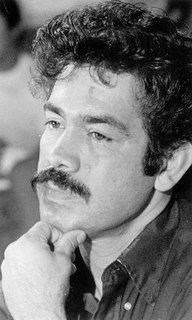
Rodolfo "Corky" Gonzales was a Mexican American boxer, poet, political organizer, and activist. He was one of many leaders for the Crusade for Justice in Denver, Colorado. The Crusade for Justice was an urban rights and Chicano cultural urban movement during the 1960s focusing on social, political, and economic justice for Chicanos. Gonzales convened the first-ever Chicano Youth Liberation Conference in 1968, which was poorly attended due to timing and weather conditions. He tried again in March 1969, and established what is commonly known as the First Chicano Youth Liberation Conference. This conference was attended by many future Chicano activists and artists. It also birthed the Plan Espiritual de Aztlán, a pro-indigenist manifesto advocating revolutionary Chicano nationalism and self-determination for all Chicanos. Through the Crusade for Justice, Gonzales organized the Mexican American people of Denver to fight for their cultural, political, and economic rights, leaving his mark on history. He was honored with a Google Doodle in continued celebration of National Hispanic Heritage Month in the United States on 30 September 2021.
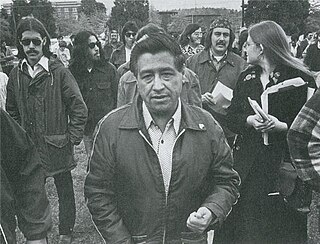
The Chicano Movement, also referred to as El Movimiento, was a social and political movement in the United States inspired by prior acts of resistance among people of Mexican descent, especially of Pachucos in the 1940s and 1950s, and the Black Power movement, that worked to embrace a Chicano/a identity and worldview that combated structural racism, encouraged cultural revitalization, and achieved community empowerment by rejecting assimilation. Before this, Chicano/a had been a term of derision, adopted by some Pachucos as an expression of defiance to Anglo-American society. With the rise of Chicanismo, Chicano/a became a reclaimed term in the 1960s and 1970s, used to express political autonomy, ethnic and cultural solidarity, and pride in being of Indigenous descent, diverging from the assimilationist Mexican-American identity. Chicanos also expressed solidarity and defined their culture through the development of Chicano art during El Movimiento, and stood firm in preserving their religion.

The Centro Cultural de la Raza is a non-profit organization with the specific mission to create, preserve, promote and educate about Chicano, Mexicano, Native American and Latino art and culture. It is located in Balboa Park in San Diego, California.The cultural center supports and encourages the creative expression “of the indigenous cultures of the Americas.” It is currently a member of the American Alliance of Museums.
Taco Shop Poets is the name of a poetry and spoken word collective formed in 1994 at a Poetry Series, Taco Shop Poetry',' hosted by Adolfo Guzman-Lopez at the Centro Cultural de la Raza in Balboa Park, San Diego. It grew to a collective of over 30 poets, band members and performance artists based at El Campo Ruse on 16th St. in Downtown San Diego's East Village.
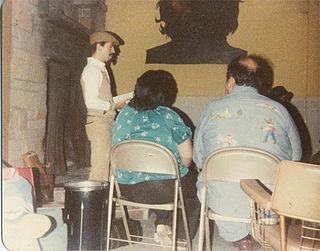
Alberto Baltazar Urista Heredia, better known by his nom de plume Alurista, is a Chicano poet and activist.

Juan Felipe Herrera is a poet, performer, writer, cartoonist, teacher, and activist. Herrera was the 21st United States Poet Laureate from 2015 to 2017.

The Sinaloa Cartel, also known as the CDS, the Guzmán-Loera Organization, the Pacific Cartel, the Federation and the Blood Alliance, is a large international drug trafficking, money laundering, and organized crime syndicate established in Mexico during the late 1980s as one of a various number of "plazas" operating under a predecessor organization known as the Guadalajara Cartel. It is currently headed by Ismael Zambada García and is based in the city of Culiacán, Sinaloa, with operations in many world regions but primarily in the Mexican states of Sinaloa, Baja California, Durango, Sonora, and Chihuahua. It also has a notable presence in a number of other regions in Latin America, such as Colombia; as well as in cities across the U.S. The United States Intelligence Community generally considers the Sinaloa Cartel to be the most powerful drug trafficking organization in the Western Hemisphere, making it perhaps even more influential and capable than the infamous Medellín Cartel of Colombia was during its prime. It has repeatedly been said to be one of the strongest criminal organizations in the world and indisputably the most powerful in Mexico since at least the late 2000s and early 2010s by various sources including the Los Angeles Times.

Luis Alberto Urrea is a Mexican American poet, novelist, and essayist.
Baja Med is a term conceived by Chef Miguel Ángel Guerrero that refers to fusion cuisine of Mexican cuisine, such as chicharrón and cotija cheese, with those of Mediterranean, such as olive oil, and Asian cuisine, such as lemongrass. Baja Med dishes showcase the fresh produce and seafood of Baja California.
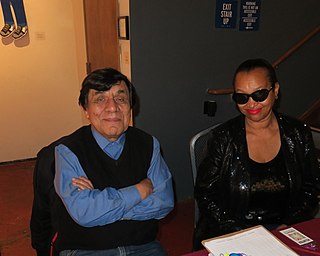
René Yañez was a Mexican-American painter, assemblage artist, performance artist, curator and community activist located in San Francisco, California. He was a well-known contributor to the arts of San Francisco and is a co-founder of Galería de la Raza, a non-profit community focused gallery that features Latino and Chicano artists and their allies. In the early 1970s, he was one of the first curators in the United States to introduce Mexico's Día de Muertos as a contemporary focus and an important cultural celebration.
Hijas de Cuauhtémoc was a student Chicana feminist newspaper founded in 1971 by Anna Nieto-Gómez and Adelaida Castillo while both were students at California State University, Long Beach.
Xicanx is a gender-neutral neologism and identity referring to people of Mexican and Latin American descent in the United States. The ⟨-x⟩ suffix replaces the ⟨-o/-a⟩ ending of Chicano and Chicana that are typical of grammatical gender in Spanish. The term references a connection to Indigeneity, decolonial consciousness, inclusion of genders outside the Western gender binary imposed through colonialism, and transnationality. In contrast, most Hispanics tend to define themselves in nationalist terms, such as by a Latin American country of origin.
A Mexican American is a resident of the United States who is of Mexican descent. Mexican American-related topics include the following:

Ricardo Sánchez was a writer, poet, professor, and activist. Sometimes called the "Grandfather of Chicano poetry," Sánchez gained national acclaim for his 1971 poetry collection Canto y Grito Mi Liberacion. Incarcerated in his twenties for stealing money to feed his struggling family, Sánchez read extensively and even learned Hebrew while at Soledad Prison in California. Upon his release in 1969, his poems were included in a poetry anthology. In 1971, his first solo collection of poetry was published, establishing Sánchez as one of the nation's most important Chicano poets.